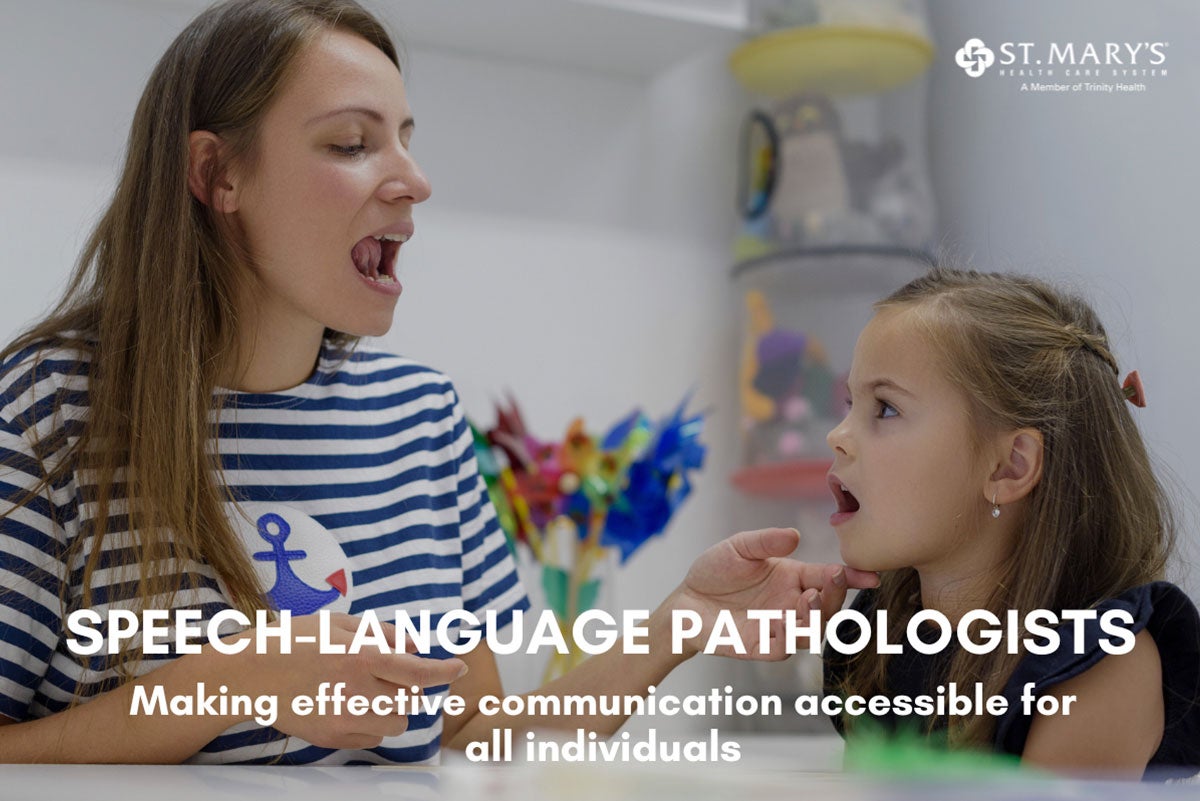How a Speech Pathologist Supports Develop Communication Skills
How a Speech Pathologist Supports Develop Communication Skills
Blog Article
How a Speech Pathologist Can Help Improve Interaction Skills
Efficient interaction is a keystone of specialist and personal success, yet many individuals deal with difficulties that hinder their ability to share themselves clearly. A speech pathologist is furnished to deal with these obstacles via targeted analysis and treatment methods customized to each individual's demands. By utilizing evidence-based restorative techniques, they not just function to enhance speech and language disorders yet additionally improve overall communicative capability. Recognizing the diverse role of a speech pathologist discloses exactly how their know-how can transform lives, inviting a more detailed evaluation of the specific approaches and results related to their technique.
Understanding Interaction Conditions
Recognizing communication problems is vital for identifying exactly how they influence individuals' capacity to reveal themselves and involve with others. Communication problems encompass a large range of problems that influence speech, language, and social interaction, commonly preventing effective communication. These problems can arise from different variables, including neurological conditions, developing hold-ups, physical impairments, or mental problems.
Speech problems might manifest as problems in fluency, expression, or voice manufacturing, influencing how words are pronounced or spoken. Language conditions, on the various other hand, entail challenges in understanding or using language, which can hinder both verbal and non-verbal interaction. Social interaction disorders are characterized by problems in the pragmatic elements of interaction, such as taking kip down discussion or understanding social hints.
The effects of interaction problems are extensive, influencing not just the person's capacity to communicate feelings and ideas yet also their social relationships, educational opportunities, and overall quality of life. Awareness of these disorders can cultivate compassion and assistance, motivating efficient techniques for communication and engagement. Understanding the intricacies of interaction conditions is a critical action in the direction of promoting inclusivity and dealing with the needs of those affected.
Duty of a Speech Pathologist
Speech pathologists often play a crucial role in dealing with and diagnosing interaction problems, utilizing a variety of evidence-based strategies customized to each person's requirements. These professionals deal with people across the life-span, from youngsters with speech delays to grownups recuperating from strokes or terrible mind injuries. Their expertise includes a variety of interaction problems, consisting of articulation, voice, fluency, and language problems.
In restorative setups, speech pathologists use organized interventions designed to improve interaction skills. They might execute approaches such as speech exercises, language video games, and social communication training to assist in improvements in meaningful and receptive language abilities. Speech Pathologist. Furthermore, they enlighten clients and their family members regarding efficient interaction techniques and adaptive approaches to navigate daily communications
Beyond direct therapy, speech pathologists team up with various other healthcare experts, instructors, and caregivers to make certain a comprehensive method to therapy. They support for customers by providing resources and support, allowing individuals to accomplish their interaction objectives and boost their total lifestyle. As experts in the field, speech pathologists are necessary in cultivating reliable interaction, advertising freedom, and boosting social engagement for those with interaction obstacles.
Analysis and Medical Diagnosis Refine
The analysis and medical diagnosis process conducted by speech pathologists generally entails an extensive assessment to identify interaction conditions precisely. This procedure begins with an in-depth medical history, where the clinician gathers relevant information concerning the person's clinical, academic, and developmental history. Recognizing the context of the person's communication difficulties is essential for an accurate medical diagnosis.
Complying with the medical history, speech pathologists make use of standard tests and casual analyses to evaluate numerous elements of communication, consisting of speech noise production, language understanding, expressive language, and social communication abilities. These assessments are customized to the individual's age and specific problems, supplying important information for analysis.
Observation is likewise a crucial part of the evaluation procedure, as it enables the medical professional to see firsthand just how the private communicates in all-natural setups. Furthermore, meetings with family participants and teachers can give insight right into the individual's interaction obstacles across various environments.
When the evaluation is total, the speech pathologist manufactures the findings to establish a diagnosis and suggest ideal interventions. This detailed assessment process makes certain that people get targeted assistance customized to their distinct interaction demands, laying the foundation for effective restorative approaches.
Therapeutic Methods and Approaches
Numerous restorative methods and approaches are employed by speech pathologists to deal with a range of interaction problems effectively. One widely used technique is expression treatment, which concentrates on correcting speech sounds with repeating and aesthetic hints. This strategy is specifically advantageous for individuals with speech sound conditions.
One more efficient method is language treatment, which improves both responsive and meaningful language abilities. This might include interactive activities that promote vocabulary advancement, sentence structure understanding, and conversational skills. Furthermore, speech pathologists typically utilize social skills training to improve pragmatic language abilities, enabling people to navigate social communications much more successfully.
Fluency shaping and stuttering adjustment strategies are particularly created to help those experiencing fluency conditions. These methods help clients create smoother speech patterns and take care of the emotional and physical components of stuttering.
Moreover, different and augmentative interaction (AAC) systems are utilized for individuals with extreme interaction impairments. These systems, which can consist of motions, signs, or digital tools, offer important assistance for efficient communication.
Advantages of Speech Therapy

Additionally, speech treatment can help in establishing vital listening and understanding abilities, promoting better communication why not try this out in conversations. Individuals with cognitive-communication problems can likewise benefit, as treatment concentrates on strengthening memory and analytic capabilities, vital for effective interaction.
One more critical facet is the emotional assistance supplied during treatment sessions. Speech pathologists create a secure atmosphere, motivating individuals to overcome anxiousness and disappointment relevant to their interaction issues. This assistance can result in boosted self-confidence and total mental health.
Furthermore, very early intervention with speech treatment can avoid more problems, making certain that individuals reach their complete communicative potential. Generally, the advantages of speech therapy prolong past mere speech enhancement, favorably impacting different measurements of life for those affected by interaction troubles.
Conclusion
In summary, speech pathologists play a critical role in attending to interaction disorders with analysis, medical diagnosis, and tailored restorative treatments. By using evidence-based techniques, these professionals improve people' Bonuses speech and language capacities, fostering improved clearness, fluency, and social communication abilities. The advantages of very early treatment underscore the significance of seeking help from speech pathologists, as their expertise can considerably improve communicative possibility, inevitably bring about greater success in both professional and personal spheres.

Speech pathologists regularly play an important duty in identifying and dealing with communication problems, employing a range of evidence-based methods customized to each person's needs. As professionals web in the area, speech pathologists are crucial in fostering effective communication, promoting self-reliance, and boosting social engagement for those with interaction challenges.

Report this page